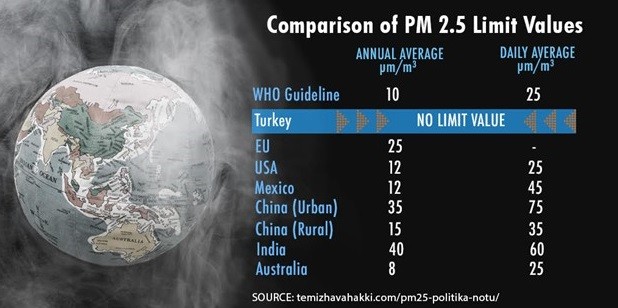In only a couple of years, public and decision-makers' attention has increased on the health…
In Turkey as in the whole of Europe, air pollution is the top environmental threat to health. However the country is lagging behind on clean air standards and monitoring of pollutants that are critical for public health, especially particulate matter with a small size, PM2.5. Unlike in the EU, there is no legal obligation to monitor this pollutant. At the end of 2019, out of 339 official monitoring stations across Turkey only 81 monitored PM2.5.
The Turkish government adopted legislation to align PM 10 limits with EU standards at the end of 2019. However, no values for PM2.5 were defined. In Australia, Canada, Japan and the US, PM2.5 standards are more in line with the health-based recommendations of the World Health Organization.
The Turkish Right to Clean Air Platform, to which HEAL is an observer member, issued a press release highlighting Turkey’s problematic backlog on 8 January.The platform called for national PM2.5 standards, for Turkish ministries to act on PM2.5 monitoring in country-wide and to establish Health Impact Assessment (HIA) as a part of the permitting processes for coal-fired power plants specifically. More information can be found on the Platform’s web article.

Tackling emissions from coal-fired power plants
The Turkish health sector has been engaged in healthy energy and in preventing coal-fired power plants for several years now. In 2019, a unique initiative by citizens, health professionals and organisations such as the Right to Clean Air Platform led the Turkish Parliament to abandon a proposal for emissions exemptions for privatised coal-fired power plants. The Turkish government had tried several times to pass legislation in this respect, which would have worsened an already poor air quality situation.
In the first days of 2020, some of these privately owned plants had to pause operation. It is expected that operators will install filtration systems and other environmental infrastructure in the course of the next months.
What is PM2.5?
Particulate matter (PM) is a critical air pollution indicator defining the amount of the mixture of solid particles found in the air. Particulate matter is measured as micrometers (μg/m3) and named by its size such as PM10, PM2.5 and PM0.1. PM2.5 is 30 times smaller than the average human hair and it can disperse thousands of kilometres beyond country borders and continents. PM2.5 is particularly important to protect public health for several reasons:
- PM2.5 can reach the deepest parts of the lungs and directly enter the blood system.
- PM2.5 is the most common index used worldwide for the calculation of air pollution-related disease burden and mortality.
- The main source of PM2.5 and smaller particulate matter (such as PM0.1) is heating, transportation, industry, electricity production, which are relevant to human activities.

